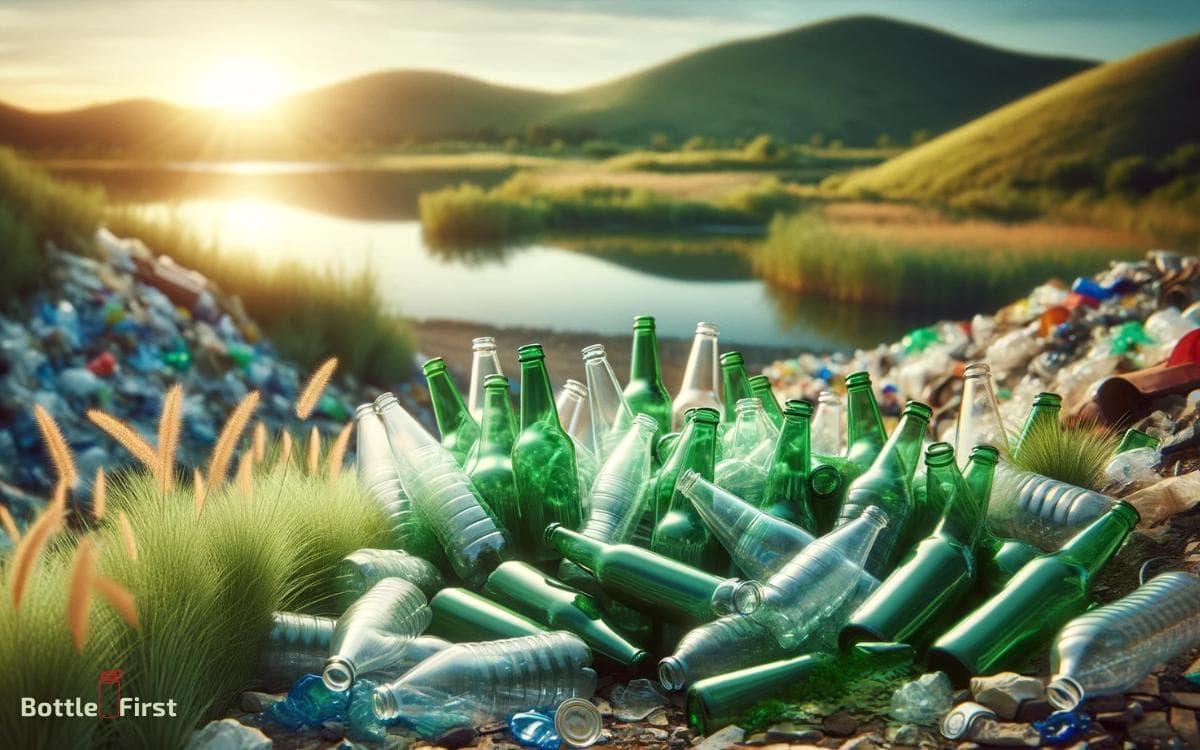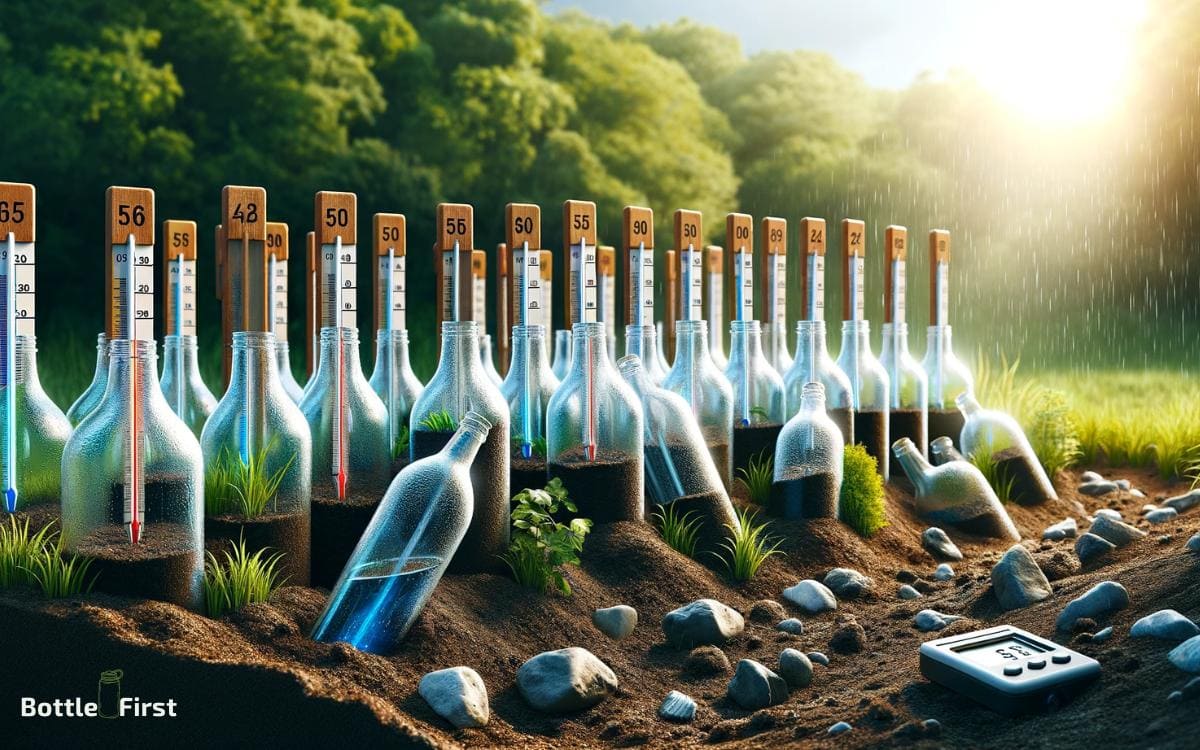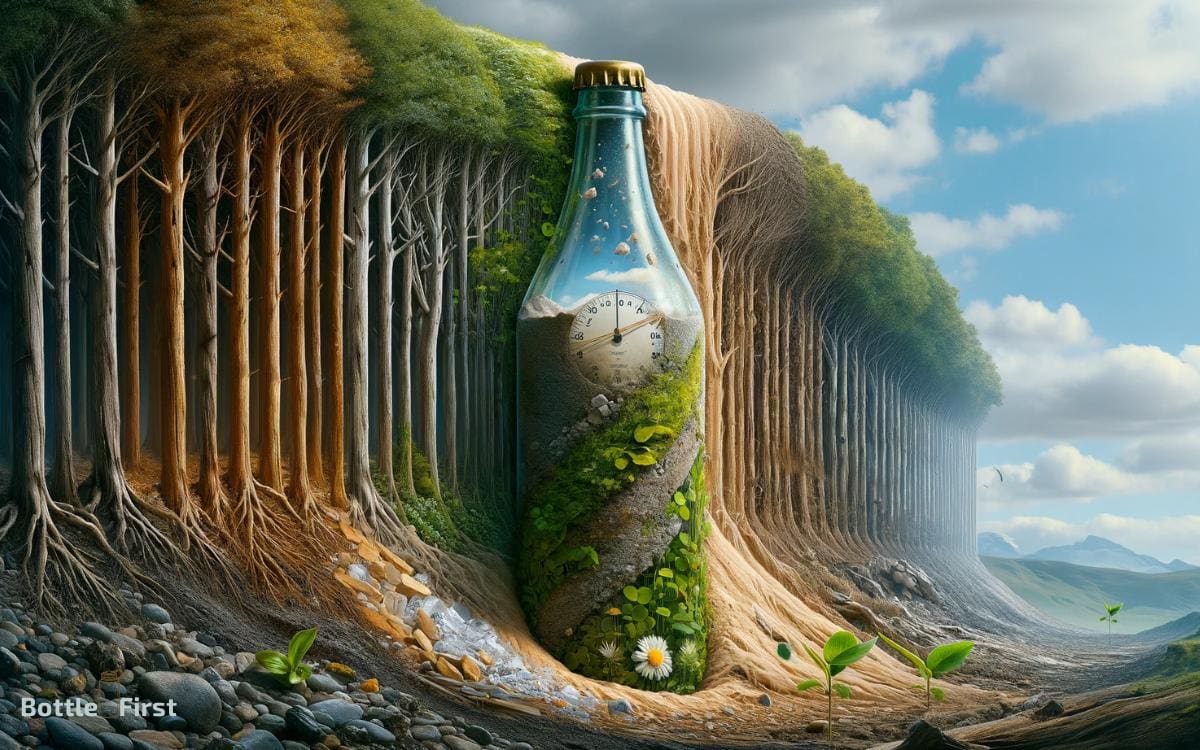How Long Does It Take a Glass Bottle to Decompose? Explore!
A glass bottle can take up to 1 million years to decompose in the environment, highlighting the importance of recycling and proper waste management.
Glass is a very durable material made from natural ingredients like sand, soda ash, and limestone.
It is inert and does not easily break down:
Proper recycling of glass bottles is essential to conserve resources and protect our environment.
Key Takeaway
Environmental Impact of Glass Bottles
The environmental impact of glass bottles is significant, affecting ecosystems and wildlife. When glass bottles end up in natural habitats, they pose a serious threat to the environment.
The non-biodegradable nature of glass means that it can persist in the environment for thousands of years, causing harm to wildlife and their habitats.
Research shows that the production of glass bottles also contributes to high energy consumption and greenhouse gas emissions, further exacerbating their environmental impact.
Innovative solutions are crucial to address this issue, such as the development of eco-friendly alternatives to glass bottles or improved recycling processes to reduce the environmental footprint of glass.
Understanding the factors affecting the decomposition rate of glass bottles is essential for implementing sustainable solutions to minimize their environmental impact.
Factors Affecting Decomposition Rate
To understand the factors affecting the decomposition rate of glass bottles, you can explore various environmental conditions and the chemical composition of the glass itself.
Factors that influence the decomposition rate include:
- Environmental Conditions: The presence of moisture, temperature fluctuations, and exposure to sunlight can significantly impact the rate of glass decomposition.
- Glass Composition: The type of glass used in the bottle, such as soda-lime glass or borosilicate glass, can affect its decomposition rate due to variations in chemical composition and structural integrity.
- Surface Area: Glass bottles with larger surface areas may decompose more rapidly than those with smaller surface areas due to increased exposure to environmental factors.
- pH Levels: The pH of the surrounding environment can influence the breakdown of glass, with acidic conditions accelerating the decomposition process.
Understanding these factors is crucial for developing innovative strategies to manage glass waste and promote sustainable practices.
Microorganisms and Glass Decomposition
Exploring the role of microorganisms in decomposing glass bottles can provide insights into the natural processes affecting their breakdown.
Microorganisms, such as bacteria and fungi, play a crucial role in the decomposition of organic matter and can also contribute to the breakdown of glass.
While glass is generally resistant to microbial degradation due to its inert nature, certain microorganisms have been found to interact with the surface of glass, leading to weathering and eventual degradation.
Understanding the specific mechanisms by which microorganisms interact with glass can offer innovative solutions for accelerating the decomposition process in controlled environments.
Below is a table summarizing the potential impact of microorganisms on glass decomposition:
| Microorganism Type | Role in Glass Decomposition |
|---|---|
| Bacteria | Surface weathering |
| Fungi | Biodegradation of organic matter adhered to glass |
Longevity of Glass Bottle Decomposition
You can observe the longevity of glass bottle decomposition in various environmental conditions, providing valuable insights into its persistence and impact on the ecosystem.
Here’s a look at some key factors shaping the longevity of glass bottle decomposition:
- Environmental Factors: The presence of moisture, temperature, and pH levels greatly influence the longevity of glass bottle decomposition.
- Glass Composition: Variations in glass composition, such as the presence of impurities or additives, can significantly impact its decomposition rate.
- Fragmentation: The size and fragmentation of glass particles play a crucial role in determining the time it takes for complete decomposition.
- Ecosystem Interaction: Understanding how glass decomposition interacts with the surrounding ecosystem sheds light on its long-term effects.
These insights contribute to the development of sustainable waste management strategies and innovations in eco-friendly packaging.
Managing Glass Waste for Sustainability
A key aspect of managing glass waste for sustainability involves implementing efficient recycling programs to minimize its impact on the environment.
By recycling glass, we can significantly reduce energy consumption, greenhouse gas emissions, and the need for raw materials.
Below is a table highlighting some key statistics and benefits of glass recycling:
| Statistics | Data |
|---|---|
| Glass recycling rate | 33% |
| Energy saved by recycling 1 ton of glass | 670 kWh |
| CO2 emissions reduced by recycling 1 ton of glass | 580 lbs |
Efficient glass recycling not only conserves resources but also reduces landfill waste and pollution.
This data emphasizes the importance of developing and promoting innovative recycling technologies to ensure a sustainable future.
Conclusion
So, it takes a glass bottle approximately 1 million years to decompose. However, with proper recycling and waste management, the longevity of glass bottle decomposition can be greatly reduced.
For example, in a case study conducted in a recycling facility, glass bottles were crushed and melted down to produce new glass products, effectively reducing the environmental impact and promoting sustainability.
This data-driven approach to managing glass waste is essential for mitigating the long-term environmental effects of glass bottle decomposition.






